International Management Report: Air Pie's Expansion into New Markets
VerifiedAdded on 2020/07/23
|9
|2701
|33
Report
AI Summary
This report examines the international management strategies of Air Pie, a fast-food restaurant company, as it expands into the Japanese and US markets. It analyzes the impact of cultural differences, using Hofstede's cultural dimensions model to understand power distance, uncertainty avoidance, individualism vs. collectivism, masculinity vs. femininity, long-term vs. short-term orientation, and indulgence vs. restraint. The report discusses the implications for operations, management, and organizational strategy, emphasizing the importance of communication, open-mindedness, and objective decision-making. Recommendations are provided to overcome cultural differences, including understanding cultural knowledge, relationship management, respecting cultures, and promoting appreciation of cultural differences. The report concludes by highlighting the importance of self-awareness, flexibility, observation, sensitivity, and communication skills for effective international management.
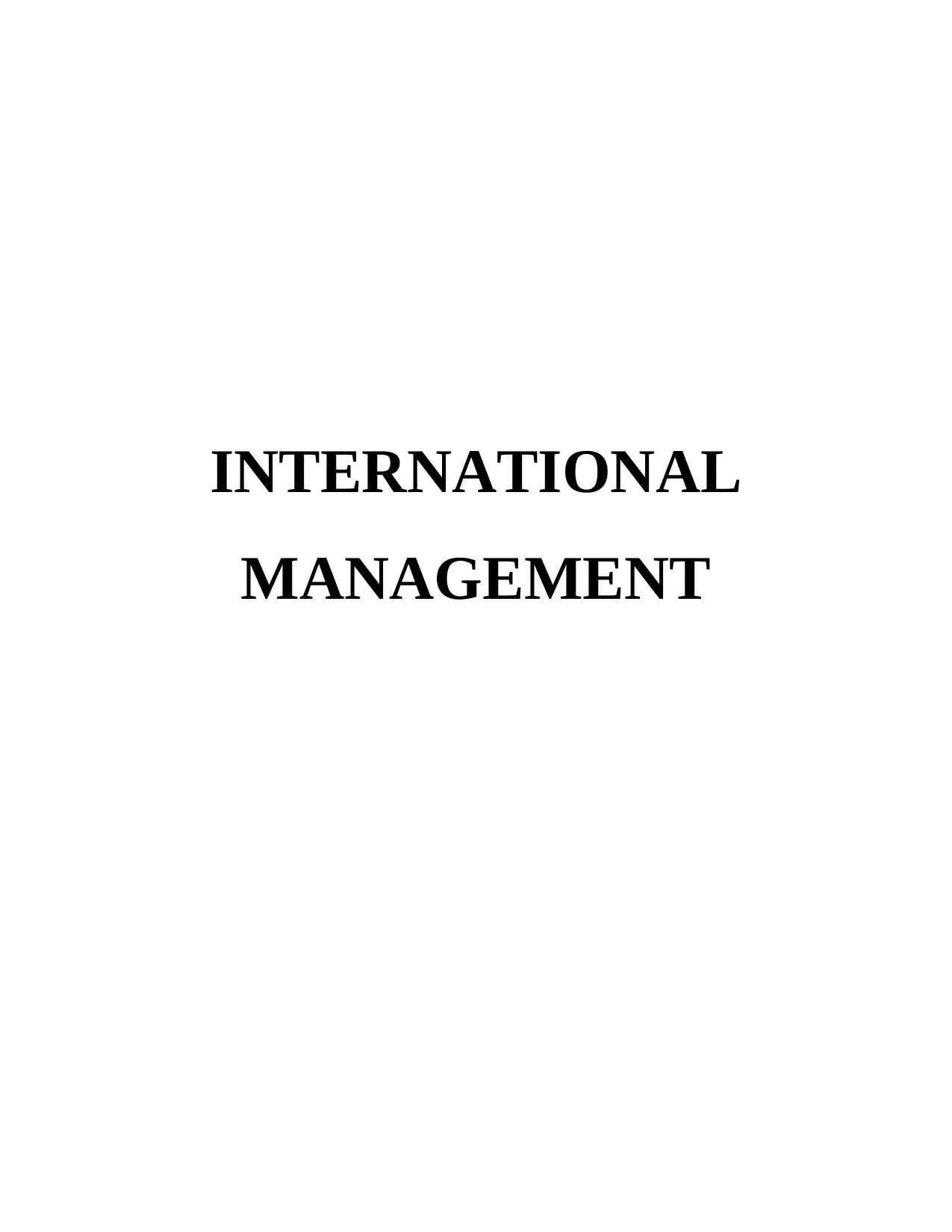
INTERNATIONAL
MANAGEMENT
MANAGEMENT
Paraphrase This Document
Need a fresh take? Get an instant paraphrase of this document with our AI Paraphraser
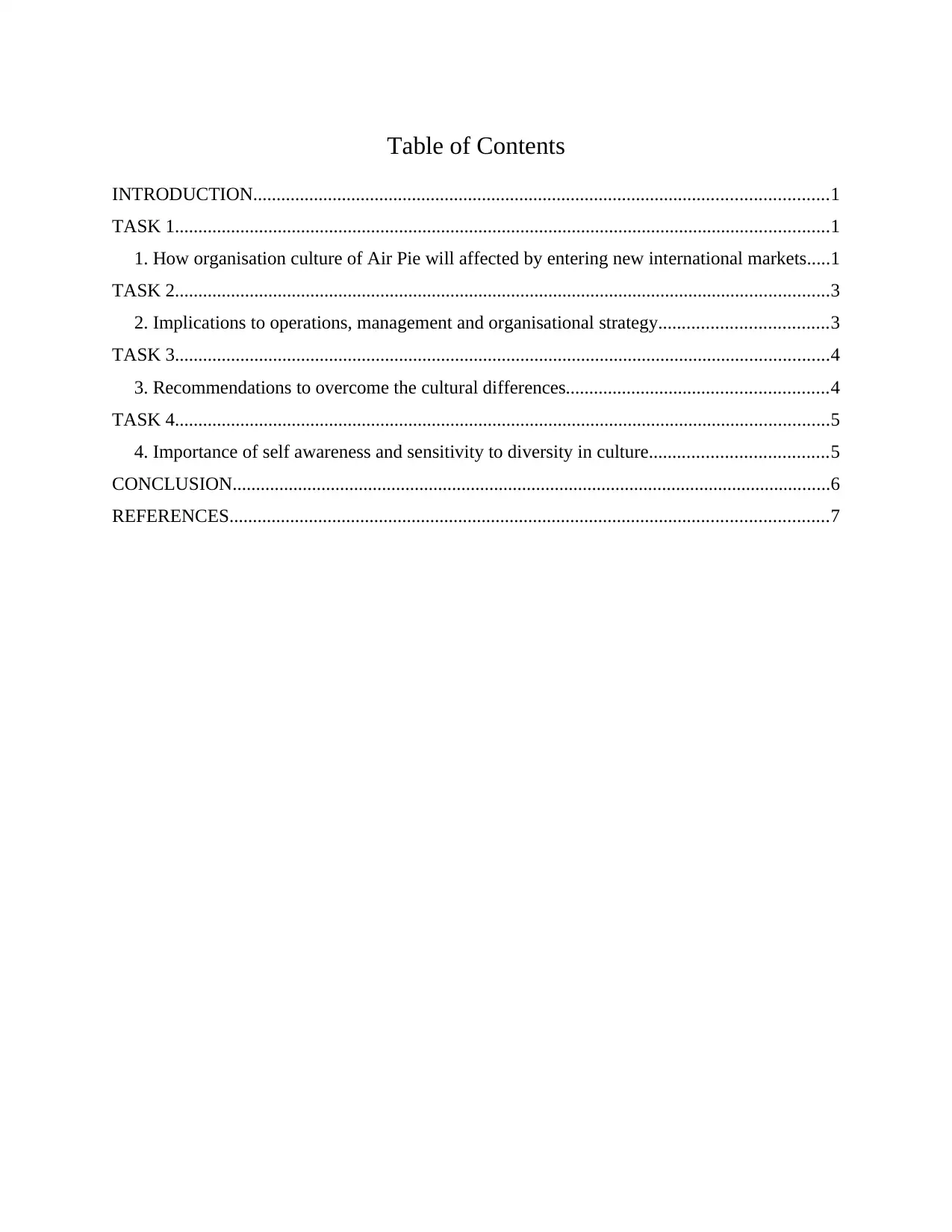
Table of Contents
INTRODUCTION...........................................................................................................................1
TASK 1............................................................................................................................................1
1. How organisation culture of Air Pie will affected by entering new international markets.....1
TASK 2............................................................................................................................................3
2. Implications to operations, management and organisational strategy....................................3
TASK 3............................................................................................................................................4
3. Recommendations to overcome the cultural differences........................................................4
TASK 4............................................................................................................................................5
4. Importance of self awareness and sensitivity to diversity in culture......................................5
CONCLUSION................................................................................................................................6
REFERENCES................................................................................................................................7
INTRODUCTION...........................................................................................................................1
TASK 1............................................................................................................................................1
1. How organisation culture of Air Pie will affected by entering new international markets.....1
TASK 2............................................................................................................................................3
2. Implications to operations, management and organisational strategy....................................3
TASK 3............................................................................................................................................4
3. Recommendations to overcome the cultural differences........................................................4
TASK 4............................................................................................................................................5
4. Importance of self awareness and sensitivity to diversity in culture......................................5
CONCLUSION................................................................................................................................6
REFERENCES................................................................................................................................7
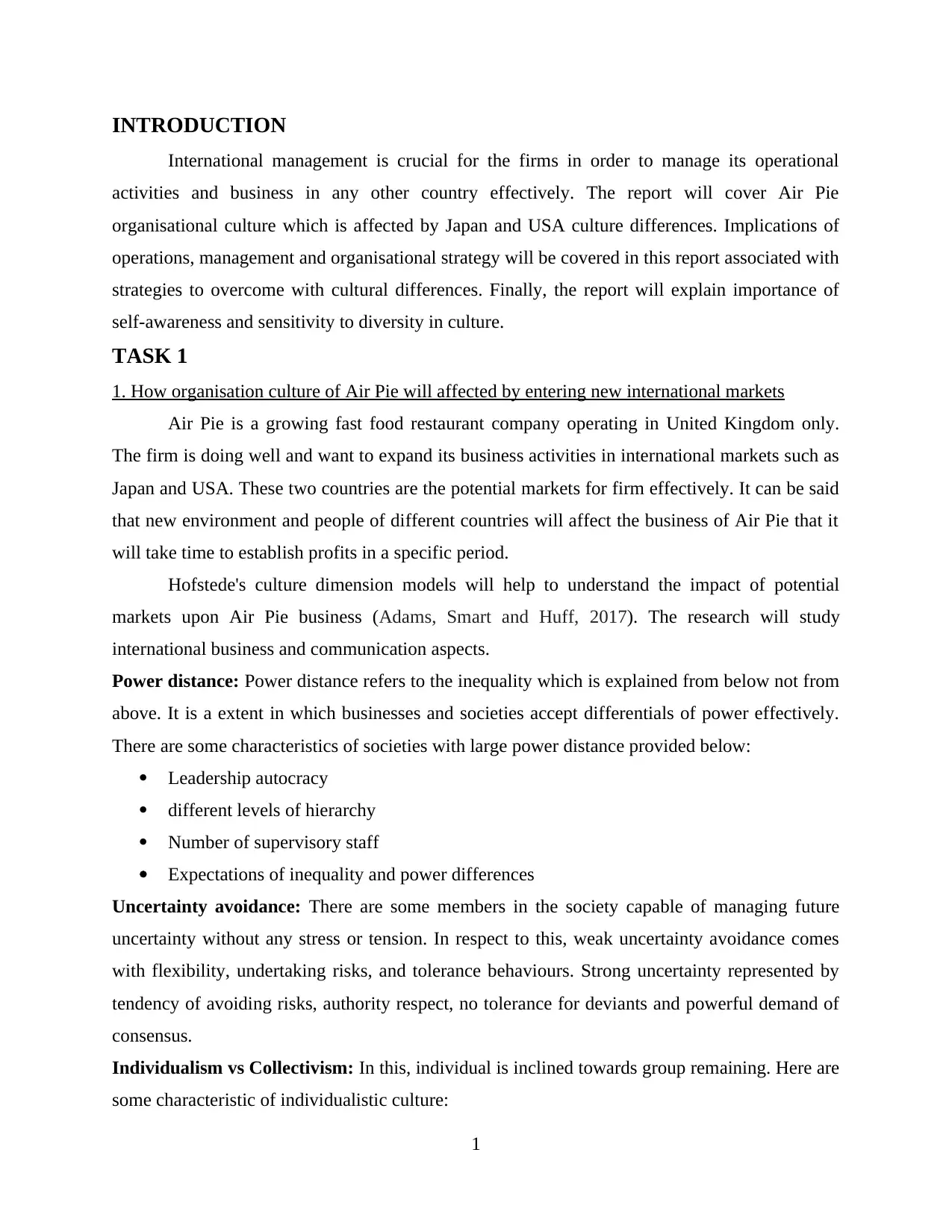
INTRODUCTION
International management is crucial for the firms in order to manage its operational
activities and business in any other country effectively. The report will cover Air Pie
organisational culture which is affected by Japan and USA culture differences. Implications of
operations, management and organisational strategy will be covered in this report associated with
strategies to overcome with cultural differences. Finally, the report will explain importance of
self-awareness and sensitivity to diversity in culture.
TASK 1
1. How organisation culture of Air Pie will affected by entering new international markets
Air Pie is a growing fast food restaurant company operating in United Kingdom only.
The firm is doing well and want to expand its business activities in international markets such as
Japan and USA. These two countries are the potential markets for firm effectively. It can be said
that new environment and people of different countries will affect the business of Air Pie that it
will take time to establish profits in a specific period.
Hofstede's culture dimension models will help to understand the impact of potential
markets upon Air Pie business (Adams, Smart and Huff, 2017). The research will study
international business and communication aspects.
Power distance: Power distance refers to the inequality which is explained from below not from
above. It is a extent in which businesses and societies accept differentials of power effectively.
There are some characteristics of societies with large power distance provided below:
Leadership autocracy
different levels of hierarchy
Number of supervisory staff
Expectations of inequality and power differences
Uncertainty avoidance: There are some members in the society capable of managing future
uncertainty without any stress or tension. In respect to this, weak uncertainty avoidance comes
with flexibility, undertaking risks, and tolerance behaviours. Strong uncertainty represented by
tendency of avoiding risks, authority respect, no tolerance for deviants and powerful demand of
consensus.
Individualism vs Collectivism: In this, individual is inclined towards group remaining. Here are
some characteristic of individualistic culture:
1
International management is crucial for the firms in order to manage its operational
activities and business in any other country effectively. The report will cover Air Pie
organisational culture which is affected by Japan and USA culture differences. Implications of
operations, management and organisational strategy will be covered in this report associated with
strategies to overcome with cultural differences. Finally, the report will explain importance of
self-awareness and sensitivity to diversity in culture.
TASK 1
1. How organisation culture of Air Pie will affected by entering new international markets
Air Pie is a growing fast food restaurant company operating in United Kingdom only.
The firm is doing well and want to expand its business activities in international markets such as
Japan and USA. These two countries are the potential markets for firm effectively. It can be said
that new environment and people of different countries will affect the business of Air Pie that it
will take time to establish profits in a specific period.
Hofstede's culture dimension models will help to understand the impact of potential
markets upon Air Pie business (Adams, Smart and Huff, 2017). The research will study
international business and communication aspects.
Power distance: Power distance refers to the inequality which is explained from below not from
above. It is a extent in which businesses and societies accept differentials of power effectively.
There are some characteristics of societies with large power distance provided below:
Leadership autocracy
different levels of hierarchy
Number of supervisory staff
Expectations of inequality and power differences
Uncertainty avoidance: There are some members in the society capable of managing future
uncertainty without any stress or tension. In respect to this, weak uncertainty avoidance comes
with flexibility, undertaking risks, and tolerance behaviours. Strong uncertainty represented by
tendency of avoiding risks, authority respect, no tolerance for deviants and powerful demand of
consensus.
Individualism vs Collectivism: In this, individual is inclined towards group remaining. Here are
some characteristic of individualistic culture:
1
⊘ This is a preview!⊘
Do you want full access?
Subscribe today to unlock all pages.

Trusted by 1+ million students worldwide
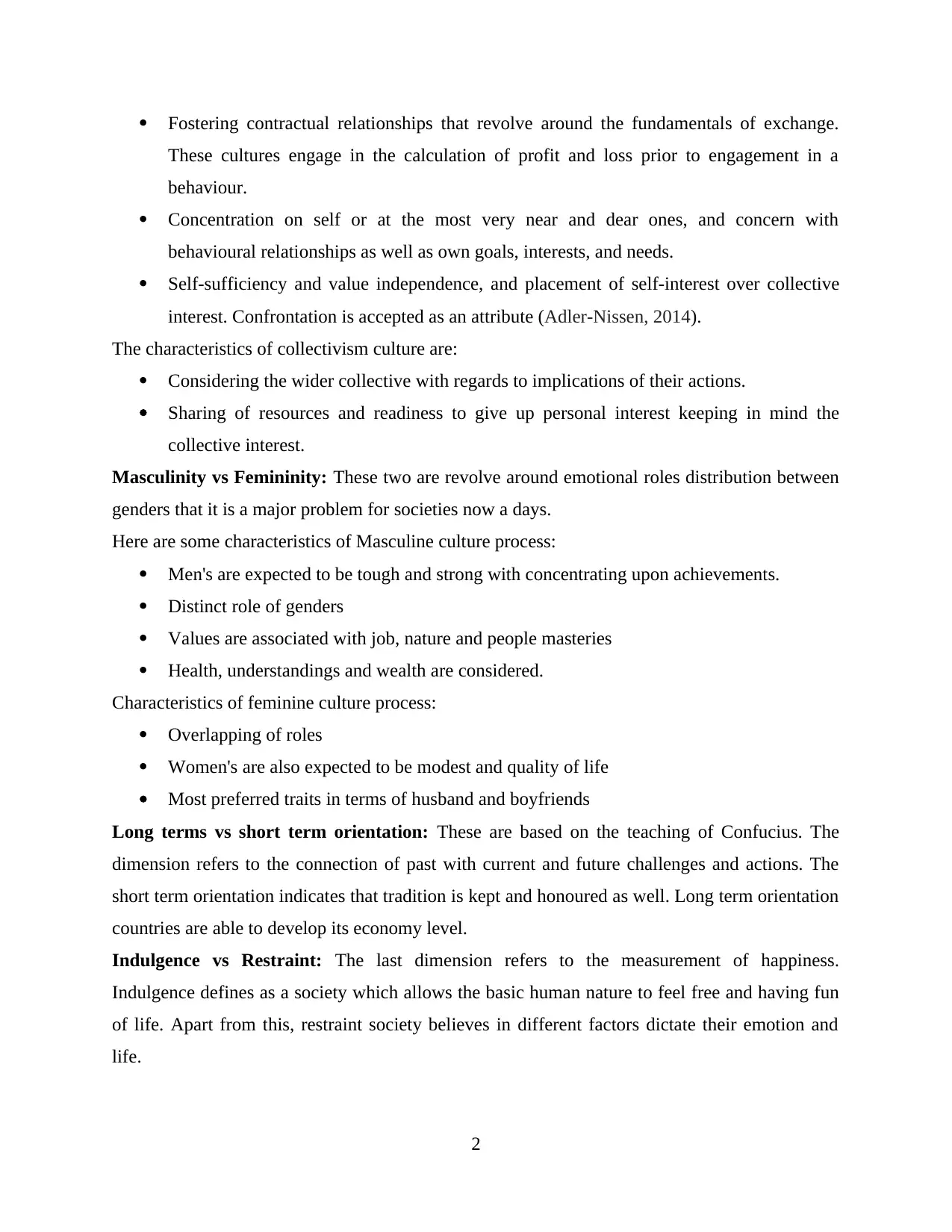
Fostering contractual relationships that revolve around the fundamentals of exchange.
These cultures engage in the calculation of profit and loss prior to engagement in a
behaviour.
Concentration on self or at the most very near and dear ones, and concern with
behavioural relationships as well as own goals, interests, and needs.
Self-sufficiency and value independence, and placement of self-interest over collective
interest. Confrontation is accepted as an attribute (Adler-Nissen, 2014).
The characteristics of collectivism culture are:
Considering the wider collective with regards to implications of their actions.
Sharing of resources and readiness to give up personal interest keeping in mind the
collective interest.
Masculinity vs Femininity: These two are revolve around emotional roles distribution between
genders that it is a major problem for societies now a days.
Here are some characteristics of Masculine culture process:
Men's are expected to be tough and strong with concentrating upon achievements.
Distinct role of genders
Values are associated with job, nature and people masteries
Health, understandings and wealth are considered.
Characteristics of feminine culture process:
Overlapping of roles
Women's are also expected to be modest and quality of life
Most preferred traits in terms of husband and boyfriends
Long terms vs short term orientation: These are based on the teaching of Confucius. The
dimension refers to the connection of past with current and future challenges and actions. The
short term orientation indicates that tradition is kept and honoured as well. Long term orientation
countries are able to develop its economy level.
Indulgence vs Restraint: The last dimension refers to the measurement of happiness.
Indulgence defines as a society which allows the basic human nature to feel free and having fun
of life. Apart from this, restraint society believes in different factors dictate their emotion and
life.
2
These cultures engage in the calculation of profit and loss prior to engagement in a
behaviour.
Concentration on self or at the most very near and dear ones, and concern with
behavioural relationships as well as own goals, interests, and needs.
Self-sufficiency and value independence, and placement of self-interest over collective
interest. Confrontation is accepted as an attribute (Adler-Nissen, 2014).
The characteristics of collectivism culture are:
Considering the wider collective with regards to implications of their actions.
Sharing of resources and readiness to give up personal interest keeping in mind the
collective interest.
Masculinity vs Femininity: These two are revolve around emotional roles distribution between
genders that it is a major problem for societies now a days.
Here are some characteristics of Masculine culture process:
Men's are expected to be tough and strong with concentrating upon achievements.
Distinct role of genders
Values are associated with job, nature and people masteries
Health, understandings and wealth are considered.
Characteristics of feminine culture process:
Overlapping of roles
Women's are also expected to be modest and quality of life
Most preferred traits in terms of husband and boyfriends
Long terms vs short term orientation: These are based on the teaching of Confucius. The
dimension refers to the connection of past with current and future challenges and actions. The
short term orientation indicates that tradition is kept and honoured as well. Long term orientation
countries are able to develop its economy level.
Indulgence vs Restraint: The last dimension refers to the measurement of happiness.
Indulgence defines as a society which allows the basic human nature to feel free and having fun
of life. Apart from this, restraint society believes in different factors dictate their emotion and
life.
2
Paraphrase This Document
Need a fresh take? Get an instant paraphrase of this document with our AI Paraphraser
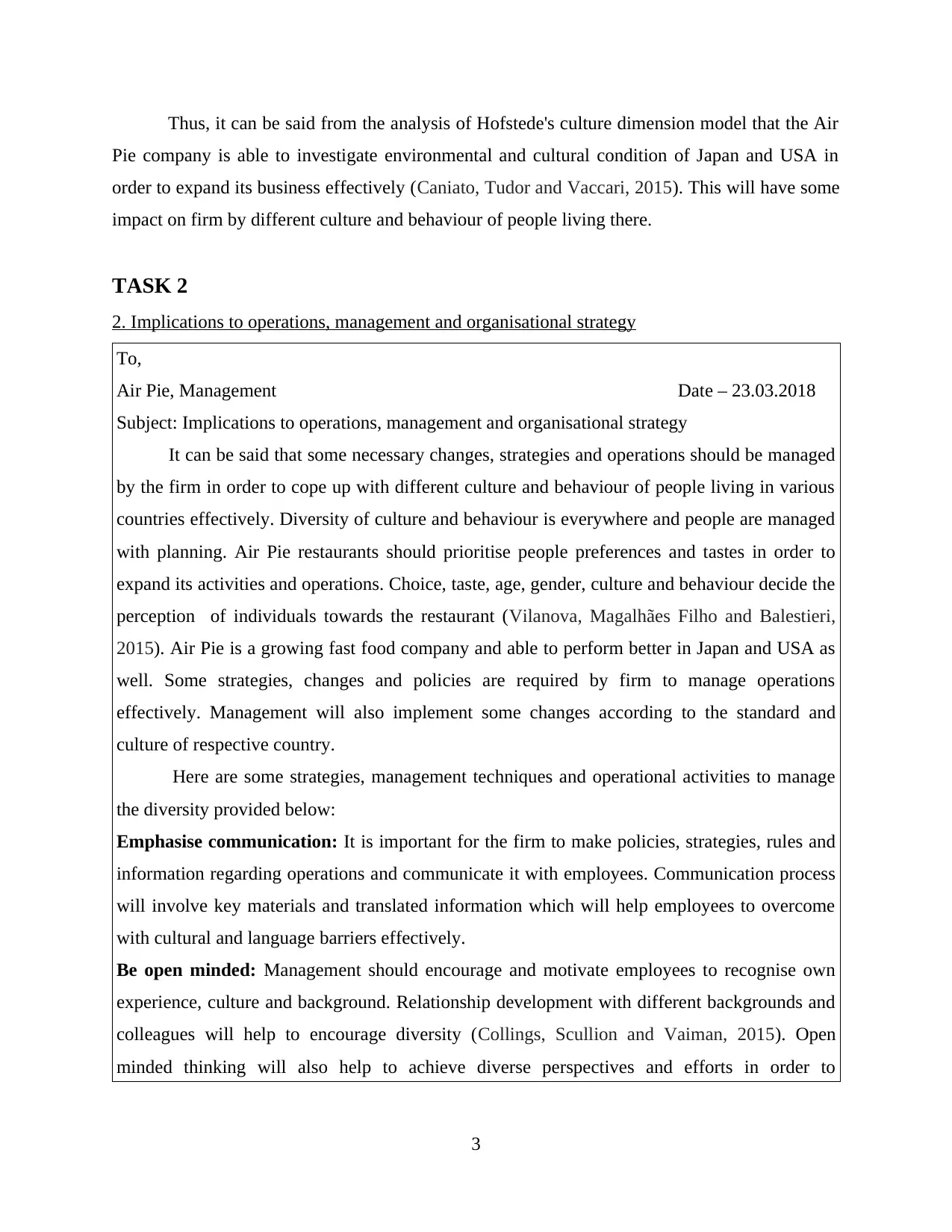
Thus, it can be said from the analysis of Hofstede's culture dimension model that the Air
Pie company is able to investigate environmental and cultural condition of Japan and USA in
order to expand its business effectively (Caniato, Tudor and Vaccari, 2015). This will have some
impact on firm by different culture and behaviour of people living there.
TASK 2
2. Implications to operations, management and organisational strategy
To,
Air Pie, Management Date – 23.03.2018
Subject: Implications to operations, management and organisational strategy
It can be said that some necessary changes, strategies and operations should be managed
by the firm in order to cope up with different culture and behaviour of people living in various
countries effectively. Diversity of culture and behaviour is everywhere and people are managed
with planning. Air Pie restaurants should prioritise people preferences and tastes in order to
expand its activities and operations. Choice, taste, age, gender, culture and behaviour decide the
perception of individuals towards the restaurant (Vilanova, Magalhães Filho and Balestieri,
2015). Air Pie is a growing fast food company and able to perform better in Japan and USA as
well. Some strategies, changes and policies are required by firm to manage operations
effectively. Management will also implement some changes according to the standard and
culture of respective country.
Here are some strategies, management techniques and operational activities to manage
the diversity provided below:
Emphasise communication: It is important for the firm to make policies, strategies, rules and
information regarding operations and communicate it with employees. Communication process
will involve key materials and translated information which will help employees to overcome
with cultural and language barriers effectively.
Be open minded: Management should encourage and motivate employees to recognise own
experience, culture and background. Relationship development with different backgrounds and
colleagues will help to encourage diversity (Collings, Scullion and Vaiman, 2015). Open
minded thinking will also help to achieve diverse perspectives and efforts in order to
3
Pie company is able to investigate environmental and cultural condition of Japan and USA in
order to expand its business effectively (Caniato, Tudor and Vaccari, 2015). This will have some
impact on firm by different culture and behaviour of people living there.
TASK 2
2. Implications to operations, management and organisational strategy
To,
Air Pie, Management Date – 23.03.2018
Subject: Implications to operations, management and organisational strategy
It can be said that some necessary changes, strategies and operations should be managed
by the firm in order to cope up with different culture and behaviour of people living in various
countries effectively. Diversity of culture and behaviour is everywhere and people are managed
with planning. Air Pie restaurants should prioritise people preferences and tastes in order to
expand its activities and operations. Choice, taste, age, gender, culture and behaviour decide the
perception of individuals towards the restaurant (Vilanova, Magalhães Filho and Balestieri,
2015). Air Pie is a growing fast food company and able to perform better in Japan and USA as
well. Some strategies, changes and policies are required by firm to manage operations
effectively. Management will also implement some changes according to the standard and
culture of respective country.
Here are some strategies, management techniques and operational activities to manage
the diversity provided below:
Emphasise communication: It is important for the firm to make policies, strategies, rules and
information regarding operations and communicate it with employees. Communication process
will involve key materials and translated information which will help employees to overcome
with cultural and language barriers effectively.
Be open minded: Management should encourage and motivate employees to recognise own
experience, culture and background. Relationship development with different backgrounds and
colleagues will help to encourage diversity (Collings, Scullion and Vaiman, 2015). Open
minded thinking will also help to achieve diverse perspectives and efforts in order to
3
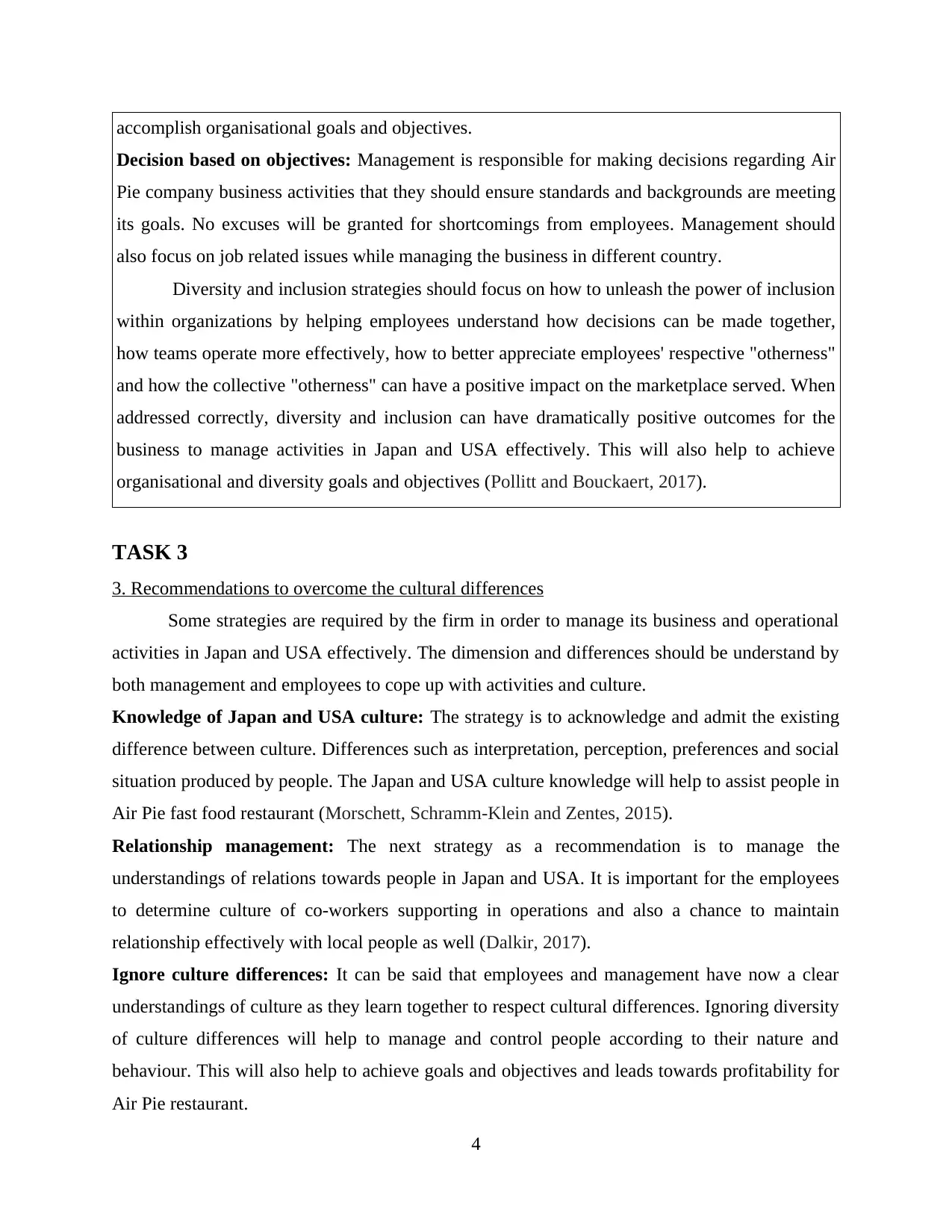
accomplish organisational goals and objectives.
Decision based on objectives: Management is responsible for making decisions regarding Air
Pie company business activities that they should ensure standards and backgrounds are meeting
its goals. No excuses will be granted for shortcomings from employees. Management should
also focus on job related issues while managing the business in different country.
Diversity and inclusion strategies should focus on how to unleash the power of inclusion
within organizations by helping employees understand how decisions can be made together,
how teams operate more effectively, how to better appreciate employees' respective "otherness"
and how the collective "otherness" can have a positive impact on the marketplace served. When
addressed correctly, diversity and inclusion can have dramatically positive outcomes for the
business to manage activities in Japan and USA effectively. This will also help to achieve
organisational and diversity goals and objectives (Pollitt and Bouckaert, 2017).
TASK 3
3. Recommendations to overcome the cultural differences
Some strategies are required by the firm in order to manage its business and operational
activities in Japan and USA effectively. The dimension and differences should be understand by
both management and employees to cope up with activities and culture.
Knowledge of Japan and USA culture: The strategy is to acknowledge and admit the existing
difference between culture. Differences such as interpretation, perception, preferences and social
situation produced by people. The Japan and USA culture knowledge will help to assist people in
Air Pie fast food restaurant (Morschett, Schramm-Klein and Zentes, 2015).
Relationship management: The next strategy as a recommendation is to manage the
understandings of relations towards people in Japan and USA. It is important for the employees
to determine culture of co-workers supporting in operations and also a chance to maintain
relationship effectively with local people as well (Dalkir, 2017).
Ignore culture differences: It can be said that employees and management have now a clear
understandings of culture as they learn together to respect cultural differences. Ignoring diversity
of culture differences will help to manage and control people according to their nature and
behaviour. This will also help to achieve goals and objectives and leads towards profitability for
Air Pie restaurant.
4
Decision based on objectives: Management is responsible for making decisions regarding Air
Pie company business activities that they should ensure standards and backgrounds are meeting
its goals. No excuses will be granted for shortcomings from employees. Management should
also focus on job related issues while managing the business in different country.
Diversity and inclusion strategies should focus on how to unleash the power of inclusion
within organizations by helping employees understand how decisions can be made together,
how teams operate more effectively, how to better appreciate employees' respective "otherness"
and how the collective "otherness" can have a positive impact on the marketplace served. When
addressed correctly, diversity and inclusion can have dramatically positive outcomes for the
business to manage activities in Japan and USA effectively. This will also help to achieve
organisational and diversity goals and objectives (Pollitt and Bouckaert, 2017).
TASK 3
3. Recommendations to overcome the cultural differences
Some strategies are required by the firm in order to manage its business and operational
activities in Japan and USA effectively. The dimension and differences should be understand by
both management and employees to cope up with activities and culture.
Knowledge of Japan and USA culture: The strategy is to acknowledge and admit the existing
difference between culture. Differences such as interpretation, perception, preferences and social
situation produced by people. The Japan and USA culture knowledge will help to assist people in
Air Pie fast food restaurant (Morschett, Schramm-Klein and Zentes, 2015).
Relationship management: The next strategy as a recommendation is to manage the
understandings of relations towards people in Japan and USA. It is important for the employees
to determine culture of co-workers supporting in operations and also a chance to maintain
relationship effectively with local people as well (Dalkir, 2017).
Ignore culture differences: It can be said that employees and management have now a clear
understandings of culture as they learn together to respect cultural differences. Ignoring diversity
of culture differences will help to manage and control people according to their nature and
behaviour. This will also help to achieve goals and objectives and leads towards profitability for
Air Pie restaurant.
4
⊘ This is a preview!⊘
Do you want full access?
Subscribe today to unlock all pages.

Trusted by 1+ million students worldwide
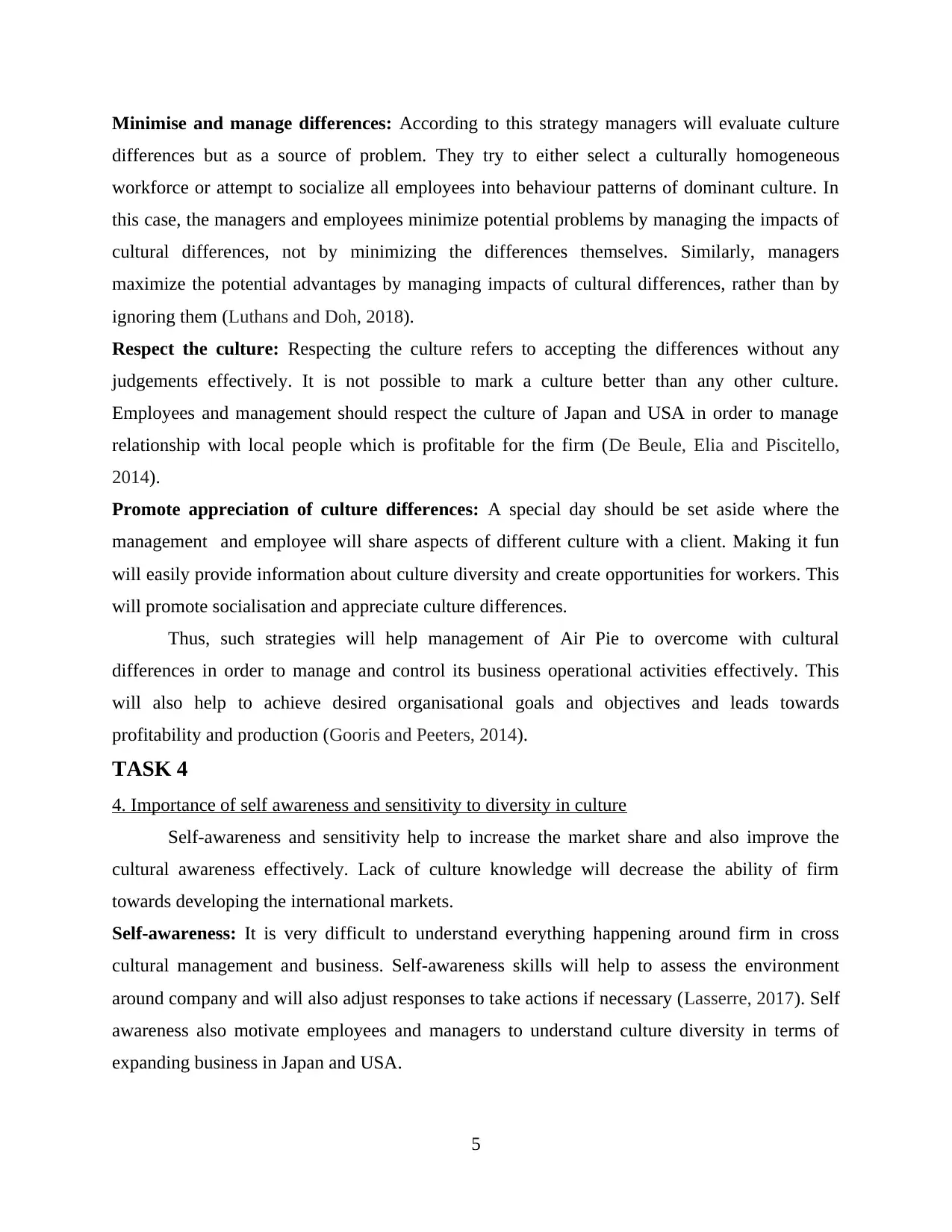
Minimise and manage differences: According to this strategy managers will evaluate culture
differences but as a source of problem. They try to either select a culturally homogeneous
workforce or attempt to socialize all employees into behaviour patterns of dominant culture. In
this case, the managers and employees minimize potential problems by managing the impacts of
cultural differences, not by minimizing the differences themselves. Similarly, managers
maximize the potential advantages by managing impacts of cultural differences, rather than by
ignoring them (Luthans and Doh, 2018).
Respect the culture: Respecting the culture refers to accepting the differences without any
judgements effectively. It is not possible to mark a culture better than any other culture.
Employees and management should respect the culture of Japan and USA in order to manage
relationship with local people which is profitable for the firm (De Beule, Elia and Piscitello,
2014).
Promote appreciation of culture differences: A special day should be set aside where the
management and employee will share aspects of different culture with a client. Making it fun
will easily provide information about culture diversity and create opportunities for workers. This
will promote socialisation and appreciate culture differences.
Thus, such strategies will help management of Air Pie to overcome with cultural
differences in order to manage and control its business operational activities effectively. This
will also help to achieve desired organisational goals and objectives and leads towards
profitability and production (Gooris and Peeters, 2014).
TASK 4
4. Importance of self awareness and sensitivity to diversity in culture
Self-awareness and sensitivity help to increase the market share and also improve the
cultural awareness effectively. Lack of culture knowledge will decrease the ability of firm
towards developing the international markets.
Self-awareness: It is very difficult to understand everything happening around firm in cross
cultural management and business. Self-awareness skills will help to assess the environment
around company and will also adjust responses to take actions if necessary (Lasserre, 2017). Self
awareness also motivate employees and managers to understand culture diversity in terms of
expanding business in Japan and USA.
5
differences but as a source of problem. They try to either select a culturally homogeneous
workforce or attempt to socialize all employees into behaviour patterns of dominant culture. In
this case, the managers and employees minimize potential problems by managing the impacts of
cultural differences, not by minimizing the differences themselves. Similarly, managers
maximize the potential advantages by managing impacts of cultural differences, rather than by
ignoring them (Luthans and Doh, 2018).
Respect the culture: Respecting the culture refers to accepting the differences without any
judgements effectively. It is not possible to mark a culture better than any other culture.
Employees and management should respect the culture of Japan and USA in order to manage
relationship with local people which is profitable for the firm (De Beule, Elia and Piscitello,
2014).
Promote appreciation of culture differences: A special day should be set aside where the
management and employee will share aspects of different culture with a client. Making it fun
will easily provide information about culture diversity and create opportunities for workers. This
will promote socialisation and appreciate culture differences.
Thus, such strategies will help management of Air Pie to overcome with cultural
differences in order to manage and control its business operational activities effectively. This
will also help to achieve desired organisational goals and objectives and leads towards
profitability and production (Gooris and Peeters, 2014).
TASK 4
4. Importance of self awareness and sensitivity to diversity in culture
Self-awareness and sensitivity help to increase the market share and also improve the
cultural awareness effectively. Lack of culture knowledge will decrease the ability of firm
towards developing the international markets.
Self-awareness: It is very difficult to understand everything happening around firm in cross
cultural management and business. Self-awareness skills will help to assess the environment
around company and will also adjust responses to take actions if necessary (Lasserre, 2017). Self
awareness also motivate employees and managers to understand culture diversity in terms of
expanding business in Japan and USA.
5
Paraphrase This Document
Need a fresh take? Get an instant paraphrase of this document with our AI Paraphraser
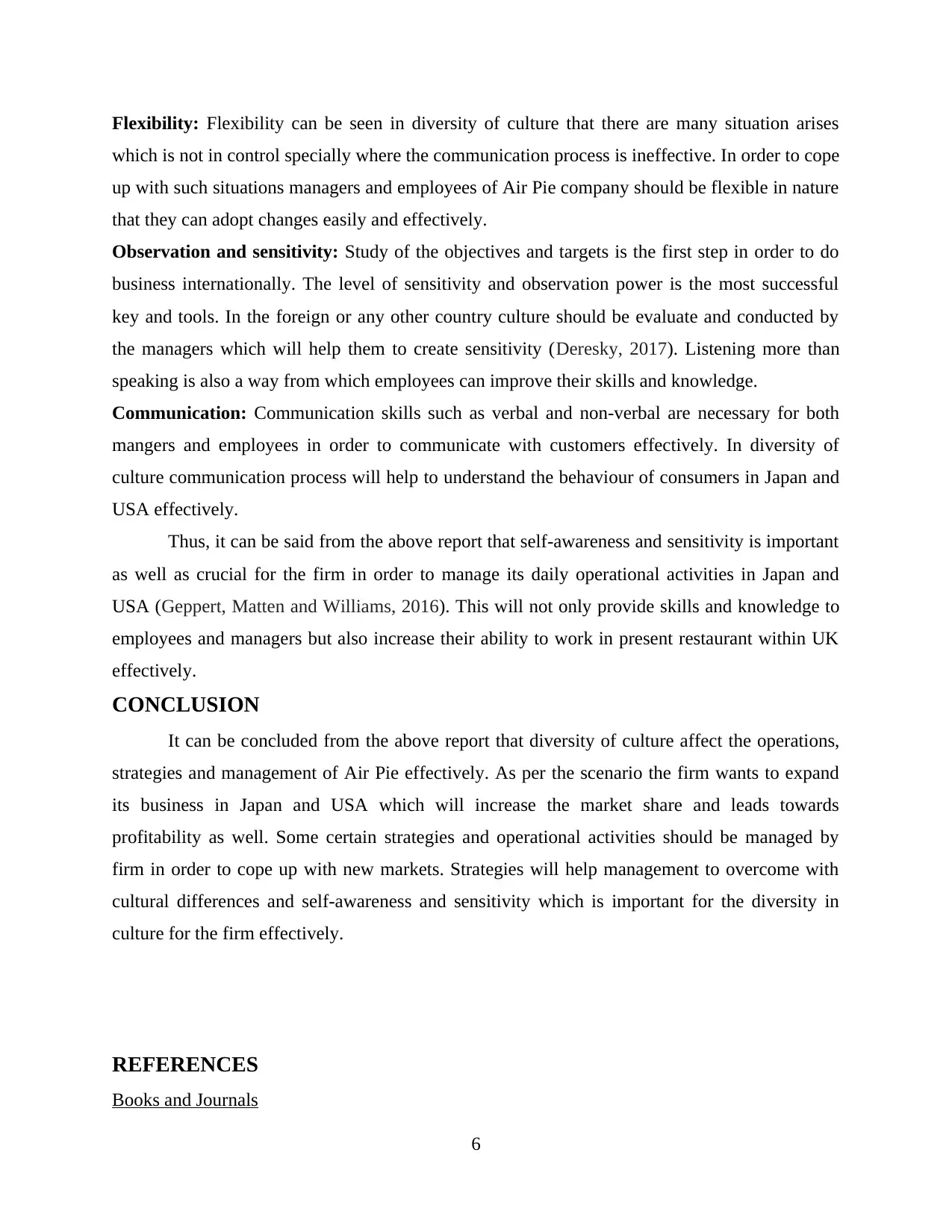
Flexibility: Flexibility can be seen in diversity of culture that there are many situation arises
which is not in control specially where the communication process is ineffective. In order to cope
up with such situations managers and employees of Air Pie company should be flexible in nature
that they can adopt changes easily and effectively.
Observation and sensitivity: Study of the objectives and targets is the first step in order to do
business internationally. The level of sensitivity and observation power is the most successful
key and tools. In the foreign or any other country culture should be evaluate and conducted by
the managers which will help them to create sensitivity (Deresky, 2017). Listening more than
speaking is also a way from which employees can improve their skills and knowledge.
Communication: Communication skills such as verbal and non-verbal are necessary for both
mangers and employees in order to communicate with customers effectively. In diversity of
culture communication process will help to understand the behaviour of consumers in Japan and
USA effectively.
Thus, it can be said from the above report that self-awareness and sensitivity is important
as well as crucial for the firm in order to manage its daily operational activities in Japan and
USA (Geppert, Matten and Williams, 2016). This will not only provide skills and knowledge to
employees and managers but also increase their ability to work in present restaurant within UK
effectively.
CONCLUSION
It can be concluded from the above report that diversity of culture affect the operations,
strategies and management of Air Pie effectively. As per the scenario the firm wants to expand
its business in Japan and USA which will increase the market share and leads towards
profitability as well. Some certain strategies and operational activities should be managed by
firm in order to cope up with new markets. Strategies will help management to overcome with
cultural differences and self-awareness and sensitivity which is important for the diversity in
culture for the firm effectively.
REFERENCES
Books and Journals
6
which is not in control specially where the communication process is ineffective. In order to cope
up with such situations managers and employees of Air Pie company should be flexible in nature
that they can adopt changes easily and effectively.
Observation and sensitivity: Study of the objectives and targets is the first step in order to do
business internationally. The level of sensitivity and observation power is the most successful
key and tools. In the foreign or any other country culture should be evaluate and conducted by
the managers which will help them to create sensitivity (Deresky, 2017). Listening more than
speaking is also a way from which employees can improve their skills and knowledge.
Communication: Communication skills such as verbal and non-verbal are necessary for both
mangers and employees in order to communicate with customers effectively. In diversity of
culture communication process will help to understand the behaviour of consumers in Japan and
USA effectively.
Thus, it can be said from the above report that self-awareness and sensitivity is important
as well as crucial for the firm in order to manage its daily operational activities in Japan and
USA (Geppert, Matten and Williams, 2016). This will not only provide skills and knowledge to
employees and managers but also increase their ability to work in present restaurant within UK
effectively.
CONCLUSION
It can be concluded from the above report that diversity of culture affect the operations,
strategies and management of Air Pie effectively. As per the scenario the firm wants to expand
its business in Japan and USA which will increase the market share and leads towards
profitability as well. Some certain strategies and operational activities should be managed by
firm in order to cope up with new markets. Strategies will help management to overcome with
cultural differences and self-awareness and sensitivity which is important for the diversity in
culture for the firm effectively.
REFERENCES
Books and Journals
6
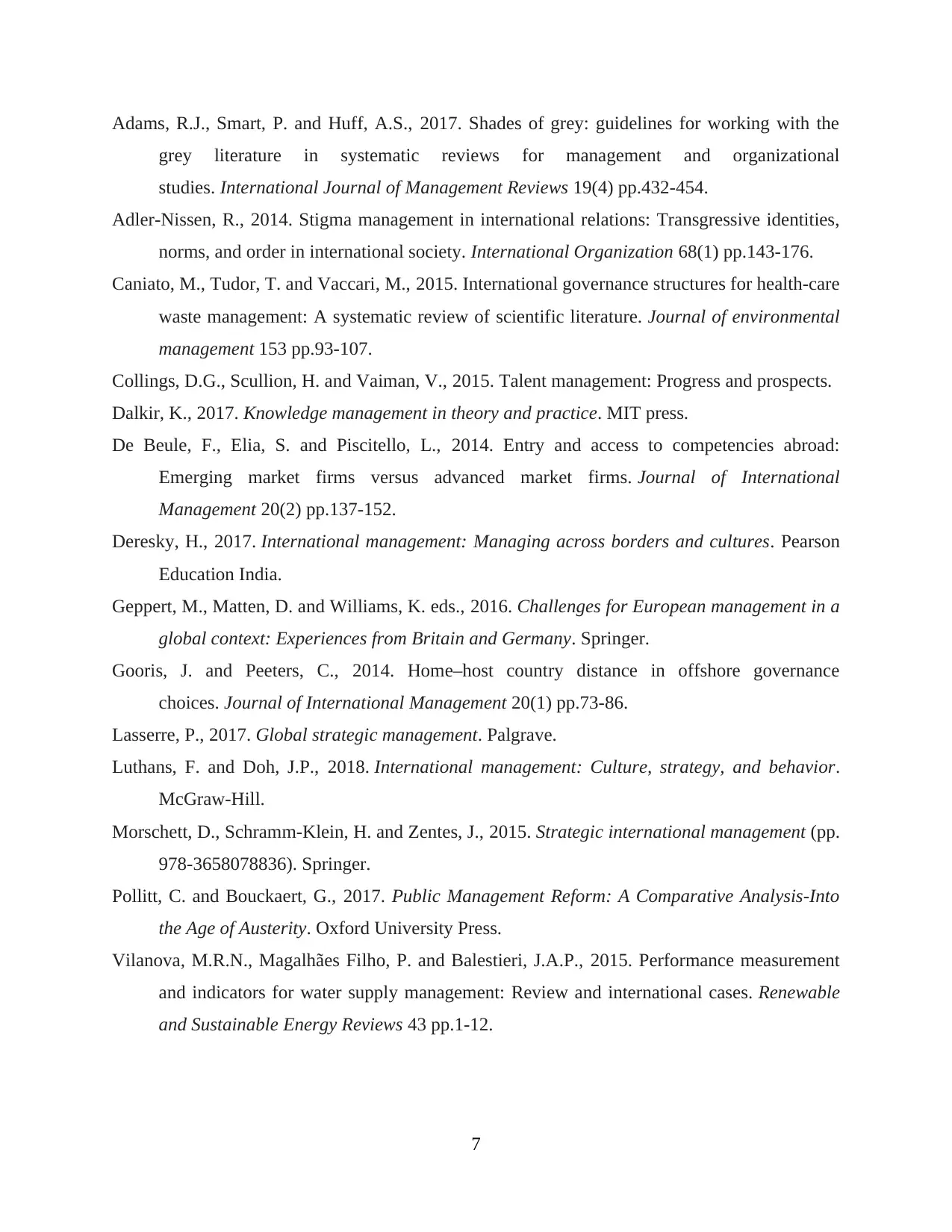
Adams, R.J., Smart, P. and Huff, A.S., 2017. Shades of grey: guidelines for working with the
grey literature in systematic reviews for management and organizational
studies. International Journal of Management Reviews 19(4) pp.432-454.
Adler-Nissen, R., 2014. Stigma management in international relations: Transgressive identities,
norms, and order in international society. International Organization 68(1) pp.143-176.
Caniato, M., Tudor, T. and Vaccari, M., 2015. International governance structures for health-care
waste management: A systematic review of scientific literature. Journal of environmental
management 153 pp.93-107.
Collings, D.G., Scullion, H. and Vaiman, V., 2015. Talent management: Progress and prospects.
Dalkir, K., 2017. Knowledge management in theory and practice. MIT press.
De Beule, F., Elia, S. and Piscitello, L., 2014. Entry and access to competencies abroad:
Emerging market firms versus advanced market firms. Journal of International
Management 20(2) pp.137-152.
Deresky, H., 2017. International management: Managing across borders and cultures. Pearson
Education India.
Geppert, M., Matten, D. and Williams, K. eds., 2016. Challenges for European management in a
global context: Experiences from Britain and Germany. Springer.
Gooris, J. and Peeters, C., 2014. Home–host country distance in offshore governance
choices. Journal of International Management 20(1) pp.73-86.
Lasserre, P., 2017. Global strategic management. Palgrave.
Luthans, F. and Doh, J.P., 2018. International management: Culture, strategy, and behavior.
McGraw-Hill.
Morschett, D., Schramm-Klein, H. and Zentes, J., 2015. Strategic international management (pp.
978-3658078836). Springer.
Pollitt, C. and Bouckaert, G., 2017. Public Management Reform: A Comparative Analysis-Into
the Age of Austerity. Oxford University Press.
Vilanova, M.R.N., Magalhães Filho, P. and Balestieri, J.A.P., 2015. Performance measurement
and indicators for water supply management: Review and international cases. Renewable
and Sustainable Energy Reviews 43 pp.1-12.
7
grey literature in systematic reviews for management and organizational
studies. International Journal of Management Reviews 19(4) pp.432-454.
Adler-Nissen, R., 2014. Stigma management in international relations: Transgressive identities,
norms, and order in international society. International Organization 68(1) pp.143-176.
Caniato, M., Tudor, T. and Vaccari, M., 2015. International governance structures for health-care
waste management: A systematic review of scientific literature. Journal of environmental
management 153 pp.93-107.
Collings, D.G., Scullion, H. and Vaiman, V., 2015. Talent management: Progress and prospects.
Dalkir, K., 2017. Knowledge management in theory and practice. MIT press.
De Beule, F., Elia, S. and Piscitello, L., 2014. Entry and access to competencies abroad:
Emerging market firms versus advanced market firms. Journal of International
Management 20(2) pp.137-152.
Deresky, H., 2017. International management: Managing across borders and cultures. Pearson
Education India.
Geppert, M., Matten, D. and Williams, K. eds., 2016. Challenges for European management in a
global context: Experiences from Britain and Germany. Springer.
Gooris, J. and Peeters, C., 2014. Home–host country distance in offshore governance
choices. Journal of International Management 20(1) pp.73-86.
Lasserre, P., 2017. Global strategic management. Palgrave.
Luthans, F. and Doh, J.P., 2018. International management: Culture, strategy, and behavior.
McGraw-Hill.
Morschett, D., Schramm-Klein, H. and Zentes, J., 2015. Strategic international management (pp.
978-3658078836). Springer.
Pollitt, C. and Bouckaert, G., 2017. Public Management Reform: A Comparative Analysis-Into
the Age of Austerity. Oxford University Press.
Vilanova, M.R.N., Magalhães Filho, P. and Balestieri, J.A.P., 2015. Performance measurement
and indicators for water supply management: Review and international cases. Renewable
and Sustainable Energy Reviews 43 pp.1-12.
7
⊘ This is a preview!⊘
Do you want full access?
Subscribe today to unlock all pages.

Trusted by 1+ million students worldwide
1 out of 9
Related Documents
Your All-in-One AI-Powered Toolkit for Academic Success.
+13062052269
info@desklib.com
Available 24*7 on WhatsApp / Email
![[object Object]](/_next/static/media/star-bottom.7253800d.svg)
Unlock your academic potential
Copyright © 2020–2025 A2Z Services. All Rights Reserved. Developed and managed by ZUCOL.





